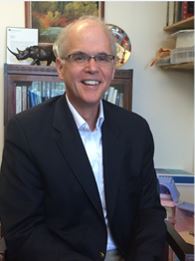(Note: parts of this posting have previously appeared in online posts for Psychology Today and for Pediatric News)
One of our own Vermont pediatricians, Dr. Joseph Hagan, is running to be President-elect of the national organization, the American Academy of Pediatrics (AAP). Many people around the state and elsewhere know Joe well and support his candidacy. Dr. Hagan has been involved in shaping pediatric mental health care policy for years as the former chair of the AAP’s Committee on the Psychosocial Aspects of Child and Family Health and  co-editor of the Bright Futures Guidelines.
co-editor of the Bright Futures Guidelines.
To provide some more information about Dr. Hagan and elicit his thoughts especially related to child mental health, I sat down with him recently for an informal interview. The following are some excerpts from that meeting.
Q: How did you become interested in running for AAP President?
A: People have asked me and I’ve always said ‘no’ but in the past few years it’s occurred to me that it’s a job that I can do. I’m ready for it and have the skill set necessary, and I felt that I could contribute something. I’ve been asked to do a number of things with the Academy over the years and I’m really proud of the fact that my academy experience over the past ten years has put me in a room with a lot of smart people and let me chair the meetings. We’ll give you product.
Q: Where do you see child mental health on your list of priorities with all the other things you would have to do?
A: I think it has been front and center for the Academy for a long time. I don’t see that changing. I’m going to use every opportunity I get to continue to work at it. It’s sort of who I am as a practitioner. It’s fascinating how capitated managed care decapitated mental health. I don’t know why we decided that the head is any different. We don’t think the kidney is different.
Q: What do you see as some of the key issues affecting child mental health care?
A: One of the things I haven’t heard a lot about is that there are not enough therapists to see kids. The system has traditionally been based upon procedures and not on time and that’s a problem. Therapists get paid less than the shop rate of your local auto mechanic, and of course, anyone who sees kids has to talk to schools and parents outside of the session. That’s non-billable, and we wonder why nobody will see kids. Mental health is part of health and the earlier we invest, the bigger the return. Since our practice was certified as a Family Centered Medical Home and now has access to a Community Health Team, my life has changed because we now have services that we didn’t have before. The problem with screening in the past has been “What if you find something?” Now we have so much more to offer.
Q: How much should a pediatrician really be expected to know and do when it comes to child behavioral problems? Is there a floor of knowledge and skills when it comes to mental health that all pediatricians should attain?
A: I think there definitely is. Behavioral and mental health problems can be managed in our offices and everyone ought to be able to manage the majority of kids with not only with ADHD, but also with oppositional defiant disorder, anxiety and depression. I mean, there are certain mental health problems that are part of pediatrics. To refer a standard ADHD child is absurd because it really is a day to day problem that needs to be managed in your primary care medical home. Everybody needs to know how to do that and do it well. It is a chronic illness and you need to hang in there with these kids.
Q: Psychiatric medications certainly have become even more controversial lately. What advice do you have for pediatricians when they prescribe them?
A: Tell families the expected effects and potential side effects. If you don’t, Dr. Google will. Start low and go slow, but titrate until desired effect of recovery. Remember if you are 100% anxious and miserable, you’ll look and feel great when your only 50% anxious, but you’re still only halfway better! It’s also important to discuss with your patient when you start meds how long you are going to continue them, lest they feel good and stop prematurely.
Q: There are a lot of efforts these days to extend the education of pediatricians and provide consulting back up while the patient remains directly in the care of pediatrician. Do you think those efforts are enough or should we be more focused on providing more psychiatrists and other mental health clinicians that pediatricians can refer to?
A: We need to be able to do this (mental health) work but part of being successful is having someone to consult with and someone to refer to. Just like with cardiac or GI problems, there are cases we can take care of all by ourselves, cases where we will need to reach out to a consultant for help, and cases that need referral. Yes we need more child psychiatrists. Co-located and collaborative care are best-case scenarios.
More information about mental health care from the American Academy of Pediatrics can be found here. More information about Dr. Hagan can be found here .
Voting for members of the AAP will take place from October 10 through November 10. If you are not a member, you can’t vote, but you still can help spread the word to pediatricians who can. Turnout for elections like these can often be rather low so motivating a few people to vote can make a big difference. Good luck Joe!

